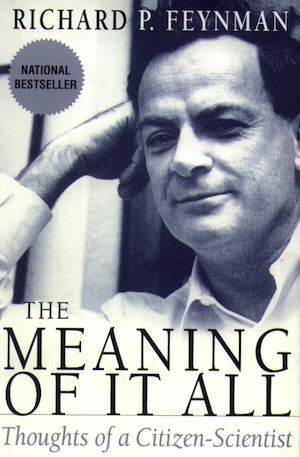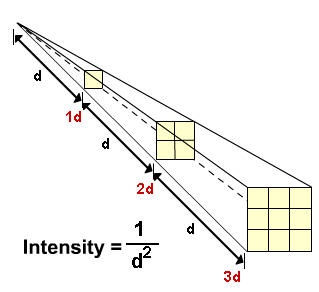
Science and the buttoned-down mind
"In talking about the impact of ideas in one field on ideas in another field, one is always apt to make a fool of oneself."
"The ideas I wish to describe here are old ideas."
 |
Science and the buttoned-down mind
|
|
John
Danz Lectures at the University of Washington |
|
"In talking about the impact of ideas in one field on ideas in another field, one is always apt to make a fool of oneself." |
|
|
"The ideas I wish to describe here are old ideas." |
|
Richard Feynman, Meaning of it All, p. 3.
"What is science? The word is usually used to mean one of three things, or a mixture of them. I do not think we need to be precise--it is not always a good idea to be too precise. Science means, sometimes, a special method of finding things out. Sometimes it means the body of knowledge arising from the things found out. It may also mean the new things you can do when you have found something out, or the actual doing of new things. This last field is usually called technology--but if you look at the science section in Time magazine you will find it covers about 50 percent what new things are found out and about 50 percent what new things can be and are being done. And so the popular definition of science is partly technology, too.I want to discuss these three aspects of science in reverse order. I will begin with the new things that you can do--that is, with technology. The most obvious characteristic of science is its application, the fact that as a consequence of science one has a power to do things. And the effect this power has had need hardly be mentioned. The whole industrial revolution would almost have been impossible without the development of science. The possibilities today of producing quantities of food adequate for such a large population, of controlling sickness--the very fact that there can be free men without the necessity of slavery for full production--are very likely the result of the development of scientific means of production."
![]()
 ' .."Ideas associated with the problems of the development of science,...are not the kind that everyone appreciates."
' .."Ideas associated with the problems of the development of science,...are not the kind that everyone appreciates."
p. 4.
I – The Uncertainty of Science
| Our three definitions of science | |
|
|
|
value in the capacity for action,
6-7
Attributes of scientific thinking:
rules are discoverable:
• observation
• objectivity
18-19
• predictable
"we merely test new ideas against observation."
"There is no authority who decides what is a good idea."
21.
The proportionality seen in the inverse square law of gravitation. "is some sort of miracle."
 So at double the distance the affect is a fraction / squared!
So at double the distance the affect is a fraction / squared!
"It leads to the possibility of prediction."
23.
This law works for gravity, electromagnetism, and the strong forces.
II – The Uncertainty of Values
"Again and again people have thought we could do much better."
admitting ignorance
". . . it is in the admission of ignorance and the admission of uncertainty that there is a hope for the continuous motion of human beings in some direction that does not get confined, permanently blocked. . . ."
p. 34
"everyday ordinary church going religion, . . . but the way ordinary people believe" here there exists an alleged conflict, if any, between science and religion."
Pp. 34-35.
a naiveté
not distracted by overload in 1963
"The applied science, for a while were thought to free men of material difficulties at lest, ..for example in medecine."
31-32
problem of duality hereEducation
Communication and
applied sciences all are double edged swords for good or bad."We have more forces of this kind to control today than did the ancients."
"...compared to our confused accomplishments."
32"don;t seem to carry any clear instructions on how to use them."
"As an example, the great accumulation of understanding as to how the physical world behaves only convinces one that this behavior has a kind of meaninglessness about it. The sciences do not directly teach good and bad."
32
"We must frankly admit that we do niot know."
33
(Weltanschauung moment ) 33.
"the worst times....were times in which there were people who believed with absolute faith and absolute dogmatism in something."
33inability to accept a different explanation for an occurrence, existence or behavior.
me
"I want to maintain here, that it is in the admission of uncertainty that there is hope for the continuous motion of human beings in some direction that doesn't get confined, permanently blocked, as it has so many times before....:
34"we do not know what is the meaning of life"
34"The great source of systems of morality and descriptions of meaning , which is in the field of religion."
What I mean by religion ....everyday, ordinary, church-going kind of religion, not the elegant theology that belongs to it, but the way ordinary people believe, in a more or less conventional way, about their religious beliefs."
34-35
something to do with creation . . . one prays for moral values
35.
"lost at the edge of functionality."
p. 39.
revolution of the earth about the sun -- a star
p. 42
Not good, just many reasons:
43-45
The four reasons why moral and ethical considerations lie outside of good science
first, metaphysical disputes were never resolved leading to a change in ethical perspectives.
Second, whose ethics are we using: Christian, Buddhist, Arab?
third, "in gathering scientific evidence nothing really suggests that the Golden Rule is fitting, appropriate, effective, or "is a good one or not."
fourth, philosophically "science and moral questions are independent." So knowing what will happen, prediction, does not tell you what you ought (should) to do. But often we do not know the outcome of an experiment.
"The method is 'try it and see'--and accumulate the information."
He in a sort of extended circular argument concludes that -- the ultimate decision of what to do with what you discover is not scientific, because to my mind it is neither testable, nor predictable, or else it would not be a manifestation of one's will.
p. 45.
We "make a mistake," if we:
"confine man to the limited imagination of today's human beings."
"We are not smart. We are dumb. We are ignorant."
Government, freedom and investigative science
"No government has the right to decide on the truth of scientific principles."
57.
"I wish therefore to destroy any image of authority."
"We are in particular in the biological sciences, on the threshold of the most remarkable discoveries."
This process of discovery ("turnng one stone over aftero another")– "has been going on now perpetually for several hundred years."
p. 62.
"it was a most remarkable and dramatic age, the transformation from not knowing much about the world to knowing a great deal more than was known before."
"And scientific is limited, of course, to those things we can tell about by trial and error."
p. 63.
The key to the error in the second lecture:
"One thing of course that we can be certain of, once we're uncertain, and that is we are uncertain."
p. 98.
"and scientific is limited, of course"
"can tell about by trial and error"
"that the failure of our program (The Ranger Program), to fail so many times,has no reasonable and simple explanation. It's not necessary that we have so many failures, as far as I can tell. There's something the matter in the organization, in the administration, in the engineering, or in the making of these instruments."
pp. 112-113.
"We've lost some face in front of the world by letting the other guys get ahead in technology.".
p. 113.
How do you get ideas?
things gained by analogies have errors.
Psychoanalysts and psychiatrists are the "witch doctors" of 1900s
p. 114.
"How do you get new ideas?"
"They wrote commentaries on commentaries. They described what each other wrote about each other.…Writing commentaries is some sort of disease of the intellect."
p. 115.
"Tradition is very important"
p. 115.
"There are great dangers in arguing from analogy."
p. 117.
"A rational process" is explained -- business accounting-- not necessarily scientific.
p. 118.
fear of military control over governmental decisions, is mentioned almost cryptically -- hidden
"is one of our great heritages" -- civilian control and military circumspection.
pp. 119-120.
Now in the days of Galileo there were great arguments about what makes a body fall, all kinds of arguments about the medium and the pushes and the pulls and so on. And what Galileo did was to disregard all the arguments and decide if it fell and how fast it fell, and just describe that."
p. 121.
Naiveté
"I consider the Encyclical of Pope John XXIII, which I have read, to be one of the most remarkable occurrences of our time and a great step to the future."
p. 122.
"I went on a visit to one of the desert sites to buy land. You know, they sell land, these promoters–there's a new city going to be built. It's exciting. It's marvelous. You must go."
p. 92.
121
John Danz Lectures at the University of Washington, April 1963. |
Pacem in Terris, ENCYCLICAL OF POPE JOHN XXIII ON ESTABLISHING UNIVERSAL PEACE IN TRUTH, JUSTICE, CHARITY, AND LIBERTY. APRIL 11, 1963.
Fyenman testimony on "O rings seals accident."
Feynman lecture "On QED" His lecture on Quantum electrodynamcis, the theory of photons and electron interactions which incorporates his unique view of the fundamental processes that create the universe."